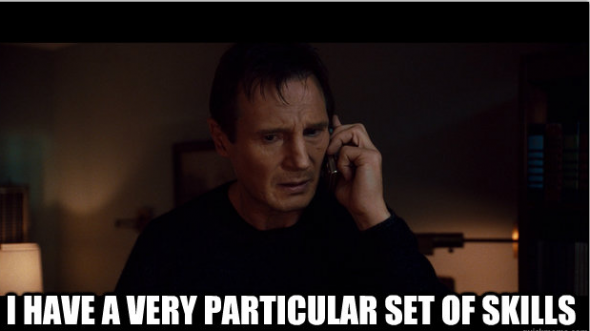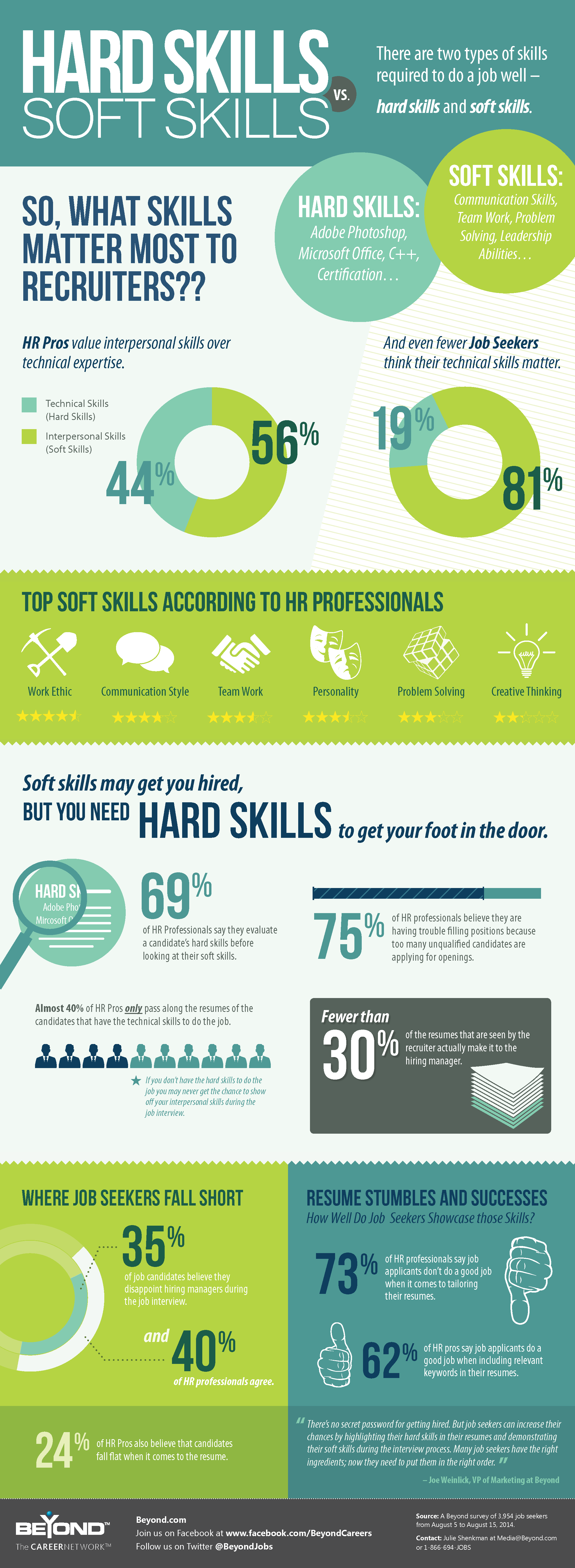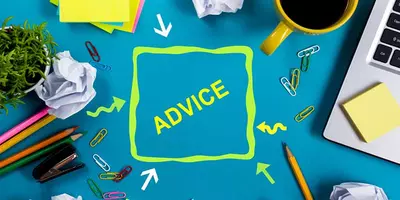May 17, 2016 ● Kate Lopaze
The Ultimate Resume Guide for Every Job Seeker
Remember that old song by Destiny’s Child, “Skills, Skills, Skills”? Oh, wait, that was “Bills, Bills, Bills.” Still, you can still use that old tune to remind you that skills are the beating heart of your resume. Work experience and your network are essential to get you to the next step, as is a solid interview performance, but skills are what get you hired. Think of them as a kind of currency: you collect them along the way, and trade them to employers in exchange for experience and more skills to add to your wealth. They’re also something that affects every level of job seeker, from the least-experienced folks just starting out to those who have many years in the trenches and are looking for a new job. No matter who you are, you can always find new and better ways to build and showcase your skills to take advantage of new opportunities.
 via Imgur
via Imgur
 “Skills” can seem like an abstract concept. We hear about social skills, communication skills, job skills, sports skills. On the most basic level, skills answer the question, “What am I good at doing?” or “What are my competencies?” In the context of the resume, we get more selective and focus almost entirely on the types of skill areas that help you do your job:
“Skills” can seem like an abstract concept. We hear about social skills, communication skills, job skills, sports skills. On the most basic level, skills answer the question, “What am I good at doing?” or “What are my competencies?” In the context of the resume, we get more selective and focus almost entirely on the types of skill areas that help you do your job:
 Soft skills are harder to pick up; they tend to come more through experience and personality instead of a class or tutorial. However, soft skills are gaining more traction in the job hunt world, as hiring managers look for personalities that will mesh well in their work environment. This is not to discount the importance of experience and hard skills—but recruiters and others are turning more and more to the less quantifiable strengths (sometimes referred to as “emotional intelligence”) that suggest a well-rounded candidate.
So which set of skills reigns supreme? Well, neither—and both. The best resume will have a strong showing in both categories, so you’ll need to find a balance between them. The important thing to remember is that your resume should play to the strengths required by the job you’re seeking. If you’re applying for a job that has a heavy computer programming focus, emphasize that on your resume, but also make sure to include bullet points about how your softer skills support that hard skill.
The way you use these skills on your resume may also be affected by what kind of goal you’re hoping to achieve in your job hunt. If you’re a non-traditional candidate (entry-level, applying for jobs after a break, or already employed), the best format for you is likely a skill-based resume over the traditional reverse-chronological format. Let’s walk through different job seeker scenarios to see what would be the best way to use your skills on your resume.
Soft skills are harder to pick up; they tend to come more through experience and personality instead of a class or tutorial. However, soft skills are gaining more traction in the job hunt world, as hiring managers look for personalities that will mesh well in their work environment. This is not to discount the importance of experience and hard skills—but recruiters and others are turning more and more to the less quantifiable strengths (sometimes referred to as “emotional intelligence”) that suggest a well-rounded candidate.
So which set of skills reigns supreme? Well, neither—and both. The best resume will have a strong showing in both categories, so you’ll need to find a balance between them. The important thing to remember is that your resume should play to the strengths required by the job you’re seeking. If you’re applying for a job that has a heavy computer programming focus, emphasize that on your resume, but also make sure to include bullet points about how your softer skills support that hard skill.
The way you use these skills on your resume may also be affected by what kind of goal you’re hoping to achieve in your job hunt. If you’re a non-traditional candidate (entry-level, applying for jobs after a break, or already employed), the best format for you is likely a skill-based resume over the traditional reverse-chronological format. Let’s walk through different job seeker scenarios to see what would be the best way to use your skills on your resume.
 If you’re just entering the workforce, creating a resume can be really tough. How do you fill in that page when you don’t yet have much experience? This is where skills become especially important—because you may not have work experience yet, but you definitely have skills. It’s just a matter of framing those in a “hire me” way. Through your classes and activities, you likely picked up experience in problem solving, or teamwork, running meetings, or communicating with others. These may not fall under the heading of “work experience” per se, but don’t count out your skills just because you haven’t been paid for them (yet!).
If you’re just entering the workforce, creating a resume can be really tough. How do you fill in that page when you don’t yet have much experience? This is where skills become especially important—because you may not have work experience yet, but you definitely have skills. It’s just a matter of framing those in a “hire me” way. Through your classes and activities, you likely picked up experience in problem solving, or teamwork, running meetings, or communicating with others. These may not fall under the heading of “work experience” per se, but don’t count out your skills just because you haven’t been paid for them (yet!).
And don’t forget personal skills as well—those can show potential employers what kind of employee you’d be. Prized personal skills include punctuality, flexibility (think “adaptable,” not “gymnast”), responsibility, persistence, and creativity. The best way to use those on your resume is to tailor the document to the job description for which you’re applying, and come up with examples (bullet points) of those skills that match the job. After all, the hiring managers will understand that you’re fresh on the job scene, experience-wise, but you want to help them understand how you’re already well equipped for that next step into the career world. Your career path might be a blank slate at this point, but you’re not.
 A similar scenario is someone who’s changing careers, or shifting lanes within an industry. If you’ve decided to pull a career switcheroo and pursue a different type of job from the ones you’ve already held, experience can be as much as an issue as it is when you’re just starting out.
A similar scenario is someone who’s changing careers, or shifting lanes within an industry. If you’ve decided to pull a career switcheroo and pursue a different type of job from the ones you’ve already held, experience can be as much as an issue as it is when you’re just starting out.
 Resume gaps can occur for a lot of different reasons: job loss + challenging hiring landscape, personal issues, maternity/paternity/family leave, etc. Whatever the reasons, your skills can be recruited to help ease the frustration of experience/work history gaps on your resume. The most important thing to remember is that this isn’t necessarily a dealbreaker: you just need to do a little extra work and tailoring to show that the gaps don’t define your career path or goals. The skills-based resume is a good option for you as well. You want to emphasize that regardless of your experience, you have the tools necessary to be a great employee.
Resume gaps can occur for a lot of different reasons: job loss + challenging hiring landscape, personal issues, maternity/paternity/family leave, etc. Whatever the reasons, your skills can be recruited to help ease the frustration of experience/work history gaps on your resume. The most important thing to remember is that this isn’t necessarily a dealbreaker: you just need to do a little extra work and tailoring to show that the gaps don’t define your career path or goals. The skills-based resume is a good option for you as well. You want to emphasize that regardless of your experience, you have the tools necessary to be a great employee.
 If you’re seeking an advancement where you already are, your case is a little different from the resume builders mentioned above—you’re already in, you just want to go up. In that case, it can be easy to dismiss the need for a resume at all. After all, they already know you, right? Not so fast.
If you’re seeking an advancement where you already are, your case is a little different from the resume builders mentioned above—you’re already in, you just want to go up. In that case, it can be easy to dismiss the need for a resume at all. After all, they already know you, right? Not so fast.
1. Which Skills Belong On Your Resume?
2. The Newbie Applicant
3. The Changing Careers Applicant
4. The Paused Career Applicant
5. The Promotion Seeker
 via Imgur
via Imgur
Which Skills Belong On Your Resume?
 “Skills” can seem like an abstract concept. We hear about social skills, communication skills, job skills, sports skills. On the most basic level, skills answer the question, “What am I good at doing?” or “What are my competencies?” In the context of the resume, we get more selective and focus almost entirely on the types of skill areas that help you do your job:
“Skills” can seem like an abstract concept. We hear about social skills, communication skills, job skills, sports skills. On the most basic level, skills answer the question, “What am I good at doing?” or “What are my competencies?” In the context of the resume, we get more selective and focus almost entirely on the types of skill areas that help you do your job:
- Communication skills: How you convey needs and results to colleagues or clients, or how you present yourself in writing and in person
- Problem solving skills: How you approach challenges in the workplace
- Organization skills: How you structure your tasks, and set up the resources you need to do them
- Technical skills: How you use tools (like specific equipment, programs, or processes) to do your job
- Interpersonal skills: How you interact with bosses, colleagues, team members
Hard Skills vs. Soft Skills
“Hard” skills are those that are easily quantifiable, and can be learned formally. Some examples:- Software training or competency (like Adobe Photoshop, Microsoft Office, InDesign, SalesTracker)
- Program certifications
- Computer programming
- Foreign language fluency
- Typing (words per minute)
RELATED: 13 Skills You Need to Put on Your Resume
“Soft” skills are those that are a little more subjective and open to interpretation—but don’t be fooled into thinking they’re less important! Some examples:- Communication
- Work ethic
- Problem solving
- Teamwork
- Organization
- Multitasking
- Adaptability
- Creativity
 Soft skills are harder to pick up; they tend to come more through experience and personality instead of a class or tutorial. However, soft skills are gaining more traction in the job hunt world, as hiring managers look for personalities that will mesh well in their work environment. This is not to discount the importance of experience and hard skills—but recruiters and others are turning more and more to the less quantifiable strengths (sometimes referred to as “emotional intelligence”) that suggest a well-rounded candidate.
So which set of skills reigns supreme? Well, neither—and both. The best resume will have a strong showing in both categories, so you’ll need to find a balance between them. The important thing to remember is that your resume should play to the strengths required by the job you’re seeking. If you’re applying for a job that has a heavy computer programming focus, emphasize that on your resume, but also make sure to include bullet points about how your softer skills support that hard skill.
The way you use these skills on your resume may also be affected by what kind of goal you’re hoping to achieve in your job hunt. If you’re a non-traditional candidate (entry-level, applying for jobs after a break, or already employed), the best format for you is likely a skill-based resume over the traditional reverse-chronological format. Let’s walk through different job seeker scenarios to see what would be the best way to use your skills on your resume.
Soft skills are harder to pick up; they tend to come more through experience and personality instead of a class or tutorial. However, soft skills are gaining more traction in the job hunt world, as hiring managers look for personalities that will mesh well in their work environment. This is not to discount the importance of experience and hard skills—but recruiters and others are turning more and more to the less quantifiable strengths (sometimes referred to as “emotional intelligence”) that suggest a well-rounded candidate.
So which set of skills reigns supreme? Well, neither—and both. The best resume will have a strong showing in both categories, so you’ll need to find a balance between them. The important thing to remember is that your resume should play to the strengths required by the job you’re seeking. If you’re applying for a job that has a heavy computer programming focus, emphasize that on your resume, but also make sure to include bullet points about how your softer skills support that hard skill.
The way you use these skills on your resume may also be affected by what kind of goal you’re hoping to achieve in your job hunt. If you’re a non-traditional candidate (entry-level, applying for jobs after a break, or already employed), the best format for you is likely a skill-based resume over the traditional reverse-chronological format. Let’s walk through different job seeker scenarios to see what would be the best way to use your skills on your resume.
The Newbie Applicant
 If you’re just entering the workforce, creating a resume can be really tough. How do you fill in that page when you don’t yet have much experience? This is where skills become especially important—because you may not have work experience yet, but you definitely have skills. It’s just a matter of framing those in a “hire me” way. Through your classes and activities, you likely picked up experience in problem solving, or teamwork, running meetings, or communicating with others. These may not fall under the heading of “work experience” per se, but don’t count out your skills just because you haven’t been paid for them (yet!).
If you’re just entering the workforce, creating a resume can be really tough. How do you fill in that page when you don’t yet have much experience? This is where skills become especially important—because you may not have work experience yet, but you definitely have skills. It’s just a matter of framing those in a “hire me” way. Through your classes and activities, you likely picked up experience in problem solving, or teamwork, running meetings, or communicating with others. These may not fall under the heading of “work experience” per se, but don’t count out your skills just because you haven’t been paid for them (yet!).
RELATED: 10 Biggest Job Search Mistakes of New College Grads
According to The Muse, there are many soft skills that you may have picked up along the way without even realizing it, including:|
Analytical skills |
Teaching classes | Editing publications |
| Dramatizing ideas of problems | Organizing people and tasks | Raising funds |
| Communication | Motivating others | Setting up demonstrations |
| Advising people writing reports | Coordinating events | Meeting the public |
| Customer Service | Finding information | Managing your own time |
| Bookkeeping | Counseling people | Interviewing people |
| Problem solver | Scheduling | Enduring long hours |
| Increasing productivity | Selling products | Escorting VIPs on tours |
| Inventing new ideas | Office management | Investigating problems |
| Displaying ideas graphically | Handling complaints | Persuading others |
| Updating files | Administering programs | Delegating responsibility |
| Analyzing data | Arranging social functions | Advertising/promoting events |
| Speaking in public | Evaluating programs | Proposing alternate approaches |
| Confronting other people | Corresponding with others | Interpreting languages |
| Listening to others | Entertaining people | Preparing materials |
| Managing an organization | Dispensing information | Working under pressure |
| Handling detail work | Sketching charts and diagrams | Working collaboratively with people with different backgrounds |
| Imagining new solutions | Planning organizational needs | Making decisions with incomplete information |
| Supervising others | Collecting money | |
| Running meetings | Compiling statistics |
The Changing Careers Applicant
 A similar scenario is someone who’s changing careers, or shifting lanes within an industry. If you’ve decided to pull a career switcheroo and pursue a different type of job from the ones you’ve already held, experience can be as much as an issue as it is when you’re just starting out.
A similar scenario is someone who’s changing careers, or shifting lanes within an industry. If you’ve decided to pull a career switcheroo and pursue a different type of job from the ones you’ve already held, experience can be as much as an issue as it is when you’re just starting out.
RELATED: 6 Things You Must Know About Changing Career
In that case, a skills-based resume could help ease that transition. In this kind of resume, you put a hefty “Skills” section front and center, followed by an abbreviated work history section—tailored to the highlights you can most easily apply to your potential new job/industry. You can also skip bulleted points, and just include company names, position titles, and dates. Definitely include any volunteer experience or internships, classes, etc. that pertain to your hoped-for job. On a traditional chronological resume for an experienced employee, you’d likely skip those (unless directly relevant to your job), but here you’re aiming for flexibility and the transferability of skills you already have.The Paused Career Applicant
 Resume gaps can occur for a lot of different reasons: job loss + challenging hiring landscape, personal issues, maternity/paternity/family leave, etc. Whatever the reasons, your skills can be recruited to help ease the frustration of experience/work history gaps on your resume. The most important thing to remember is that this isn’t necessarily a dealbreaker: you just need to do a little extra work and tailoring to show that the gaps don’t define your career path or goals. The skills-based resume is a good option for you as well. You want to emphasize that regardless of your experience, you have the tools necessary to be a great employee.
Resume gaps can occur for a lot of different reasons: job loss + challenging hiring landscape, personal issues, maternity/paternity/family leave, etc. Whatever the reasons, your skills can be recruited to help ease the frustration of experience/work history gaps on your resume. The most important thing to remember is that this isn’t necessarily a dealbreaker: you just need to do a little extra work and tailoring to show that the gaps don’t define your career path or goals. The skills-based resume is a good option for you as well. You want to emphasize that regardless of your experience, you have the tools necessary to be a great employee.
RELATED: 6 Ways to Handle Employment Gaps on Your Resume
For your skills-based resume, it’s extra important to customize your resume for the individual job description. You’ll need to be able to a) get your resume seen by someone who might be screening for more experience or who’s currently working in the field; and b) convince the reader that hmm, this person may have a gap, but s/he’s got experience and the right skills, if not doing it currently. Before applying, do your research:- Which tasks/skills are specifically outlined in the job description?
- What background information can you find about the company’s values? (Company websites often have mission statements, or brief summaries of the company’s values and goals.)
- Does anyone in your network work at this company? If so, the benefits are twofold: this person could help get your resume in the right inbox, but he or she could also give you some insight into what the company’s culture is like, and what qualities would be most welcomed.
The Promotion Seeker
 If you’re seeking an advancement where you already are, your case is a little different from the resume builders mentioned above—you’re already in, you just want to go up. In that case, it can be easy to dismiss the need for a resume at all. After all, they already know you, right? Not so fast.
If you’re seeking an advancement where you already are, your case is a little different from the resume builders mentioned above—you’re already in, you just want to go up. In that case, it can be easy to dismiss the need for a resume at all. After all, they already know you, right? Not so fast.


